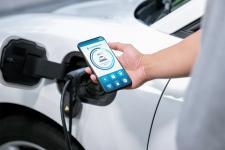EV Charging: Where to Charge Your EV if You Don’t Have a Drive?

Electric car sales have boomed recently, with over 530,000 battery-powered cars on UK roads and another 405,000 plug-in hybrids. But before you jump into going electric, there’s usually one big question at the top of the list: how do I charge my car if I don’t have a driveway at home?
If you have a driveway or a place to put an EV charging station, this kind of car is ideal for you. But the process can become much more difficult if you live in a flat or a house without a drive. In this blog, we share our top tips on getting around the issues EV charging can present.
Why is EV charging at home best?
Having an EV charging point at home is one of the cheapest ways to keep your vehicle working at full power. When left on trickle charge overnight, your electric car can fully charge for much less than a full tank of petrol would cost. And say goodbye to rushing out the door for work only to realise you need to make a mad dash to the petrol station first! If you are lucky enough to have a drive, have you considered solar panels for charging your EV?
Where possible, home charging is the best solution. But with one-third of the UK not having off-street parking with their home, this isn’t always possible. Fortunately, there are workarounds, so your dreams of having an EV aren’t over.

Alternative EV charging stations
Using the public charging network
Over 30,000 charging points are available across the UK, with supermarkets, shopping centres and gyms being some of the locations that have installed them. As more EV charging stations pop up, particularly in regularly visited places like these, it becomes more convenient to keep your car topped up on the go. Plus, with the sale of new petrol and diesel vehicles due to be banned by 2030, the public charging network is already growing at an impressive rate.
However, to manage the cost and time it takes to charge your car at public EV charging points, we would advise using the public charging network along with other methods in this blog. A quick Google search will generate results for the closest EV charging stations near you, so you never get caught out.
How long does it take to charge your car at a public EV charging point?
This depends on your car’s charging speed and the speed of the charger. The average slow charger can take between 8 - 12 hours to fully charge - not ideal for a place you’re popping into. Fast or rapid charging takes much less time, but this method costs more and isn’t great for your car’s long-term health either. Instead, these options are ideal for keeping your car topped up between 50% - 80% - the optimum advised amount to prolong battery life.
How much does it cost to charge your car on the public network?
As well as time, the cost is a significant factor when charging your EV. Prices can vary from place to place, so it’s worth doing your research to find the networks and convenient charging points that are most cost-effective.
This will quickly add up if you’re relying on rapid charging points frequently. The fastest chargers can be found around the motorway, but these are designed for top-ups that will get you to your destination.
Planning ahead and shopping around is worthwhile to save you some pennies. Alongside this, many EV charging points are introducing subscription models where a monthly or annual fee can be made. Using the same point regularly can work out cheaper per charge. You may be thinking, 'what is the point of going electric', well this guide explains the numerous actual benefits to going electric.

Charging your EV vehicle while at work
Does your workplace have plans to introduce EV charging points? If not, this could be worthwhile putting forward as businesses can receive financial support from the government as part of the Workplace Charging Scheme. Using this scheme can reduce the cost of charging stations by up to £300 per socket for a maximum of 20 sockets.
As working from home has boomed, this also offers an incentive to get employees back in the office. Workplace chargers usually have similar power to home chargers, so you can plug your car in knowing it will be charged by the end of your work day.
It’s worthwhile considering a usage scheme for workers, such as how often and long any employee can use a charger. This will help avoid conflict or unfair usage.
Making use of the On-street Residential Chargepoint Scheme
Another scheme worth checking out in your local area is the On-Street Residential Chargepoint scheme. This involves councils installing charging points around cities to support the growth of electric vehicles and allow you to top up while parked.
A few different options are available, including using lamp posts to install charging points, adding free-standing units to the pavement, or using telescopic charging points.
The time it will take to charge your vehicle at these points will vary depending on the power available in the area, but most will sit around 3kW, the same as a home charger. If these stations are available in your local area, you will most likely need to bring your own cable to use them.
Are there any free charging points in the UK?
Yes! And this is possibly the best part of owning an electric vehicle. There are thousands of free electric charging stations across the UK which can be found in public car parks, supermarkets, service stations and even hotels.
You may be asked to prove a purchase to use them or only be allowed to use them for a set period of time, but this is a very cost-effective way of charging your car. This is extra important considering the rising price of energy, but how exactly are rising energy prices affect drivers.

Is going electric right for you?
As electric cars become the norm out on the roads, we expect charging to become a much more widely available part of owning an electric vehicle. In most cases, charging an electric car is a lot cheaper on a cost-per-mile basis than fueling up with petrol or diesel. Even if you’re in a position to rely on public charging points, you should still save money on running costs.
If you want to find out more about electric cars and whether they’re right for you, contact us to chat more. Or, take a read of more useful information about going electric here.
Convinced? Get in touch with Rivervale on 01273433480 to discuss Electric Vehicle leasing. Alternatively, you can request a callback for a time that is convenient for you!





